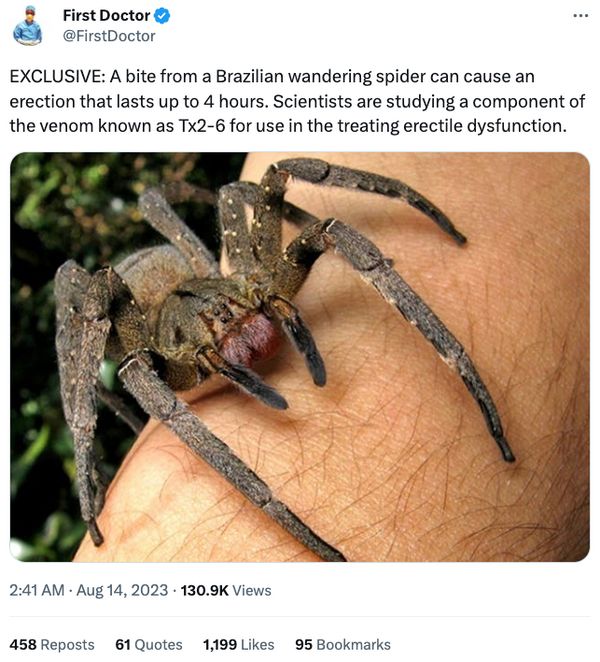On Aug. 14, 2023, the account First Doctor posted what it asserted to be an "exclusive" finding on the social media platform X, formerly known as Twitter:

While far from an exclusive — or even a remotely new — finding, the two claims in the tweet were factual. A bite from Phoneutria nigriventer, commonly known as the Brazilian wandering spider, can indeed result in a long-lasting and painful erection, a condition known as priapism when it lasts more than four hours.
While the toxicity and high risk of death posed by the chemical thought to be responsible for the erections makes its use as a potential erectile dysfunction (ED) therapy challenging, if not literally impossible, it has been used to develop similar chemicals that may have therapeutic potential.
Phoneutria nigriventer's erection-causing effects have been known to science since the 1970s. The 1971 book "Venemous Animals and Their Venom" described priapistic effects of this spider's bite on mice and dogs. The authors also included anecdotal reports from humans who had been bitten:
A pattern which resembles that of dog envenomation is also noticed in humans bitten by Phoneutria nigriventer: local unbearable pain, salivation, visual disturbances, sweating, prostration, priapism, and death.
Research published in 2008 identified the chemical within the venom likely responsible for the erections — a peptide now named PnTx2-6. "[Pn]Tx2-6 enhanced erectile function in [...] rats, via the [Nitrous Oxide] NO pathway," the study reported. "Our studies suggest that [Pn]Tx2-6 could be important for development of new pharmacological agents for treatment of erectile dysfunction."
The interest in this toxin as a treatment for ED stems, in part, because it operates in a completely different way than common ED treatments like Viagra, as reported in 2011 by NBC News:
Viagra, Levitra and other ED drugs on the market work by inhibiting an enzyme called PDE5. To get an erection, a man's body must release nitric oxide, which relaxes the smooth muscle around the arteries of the penis, allowing for his blood vessels to dilate. The nitric oxide is a first step in a series of chemical reactions that allow this muscle relaxation to take place.
One step in the series is cGMP, a signaling molecule that acts to keep the muscles relaxed. PDE5 degrades cGMP. That's a good thing for ensuring that erections don't last forever, but too much PDE5 can mean an erection doesn't happen at all. By blocking the enzyme, PDE5 inhibitors solve the problem.
The spider toxin works differently. Instead of affecting PDE5, the compound seems to trigger nitric oxide release, acting directly to relax the smooth muscles. Because about 30 percent of patients don't respond to PDE5 inhibitors, the toxin could provide an alternative to ED treatments currently on the market, [Study author Kenia] Nunes said."
In 2022, the same research group responsible for identifying PnTx2-6 published a paper arguing, in part, that due to the extreme pain and high toxicity of the chemical, its "therapeutic use is impossible," but that it is "an excellent pharmacological tool for studying erectile function." That study synthesized a new peptide, PnPP-19, based on the toxic original.
Based on studies performed on laboratory mice, PnPP-19 appears to have the potential to cause erections without the pain or toxicity of the spider venom:
This synthetic peptide also potentiates erectile function via NO/cGMP, but it [...] displays nontoxic properties in animals even at high doses. PnPP-19 effectively potentiates erectile function not only after subcutaneous or intravenous administration but also following topical application.
The assertions in First Doctor's post were factual because the priapism caused by Phoneutria nigriventer's bites have been well-documented and well-studied for decades and because the active ingredients in that venom have been used to investigate new ED therapies. As such, we rate the claim as "True."

